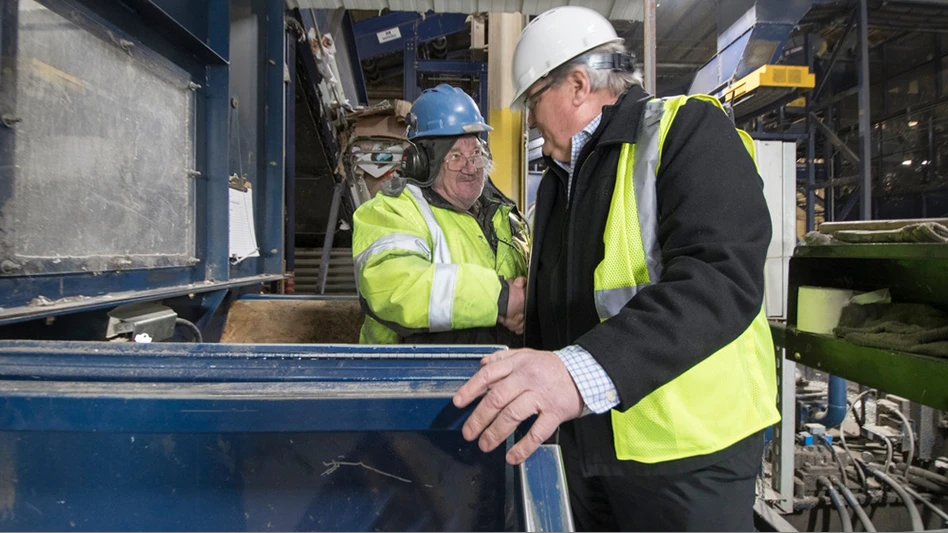
Carsten Reisinger | stock.adobe.com
Massachusetts Gov. Maura Healey’s administration has announced more than $4 million in Sustainable Materials Recovery Program (SMRP) grants to 285 municipalities and regional solid waste districts. The grants will help communities maximize their recycling, composting and waste reduction programs, the administration says.
“Every day, communities across Massachusetts are taking important steps towards environmental protection and sustainability through waste reduction,” says Massachusetts Energy and Environmental Affairs Secretary Rebecca Tepper. “This funding will further empower municipalities to implement innovative programs and policies that are proven to maximize reuse, recycling and composting.”
The SMRP Program provides funding for recycling, composting, reuse and source reduction activities that will reduce the amount of waste disposed of in landfills and incinerators. Waste prevention and recycling reduce greenhouse gas emissions by capturing the embodied energy in everyday products and packaging waste and converting it into new products. More than $60 million has been awarded through the program since 2010.
“The Recycling Dividends Program helps communities leverage the benefits of increased reuse, recycling, composting and waste reduction initiatives for a healthier economy and environment,” says Massachusetts Department of Environmental Protection Commissioner Bonnie Heiple. “This is another example of MassDEP’s commitment to building strategic partnerships with our cities and towns to build a more sustainable future.”
This year, 278 communities qualified for the Recycling Dividends Program and will receive funding totaling more than $3 million. This program recognizes municipalities that have implemented policies and programs proven to maximize materials reuse and recycling as well as waste reduction.
Communities receiving funding must reinvest in their own municipal recycling efforts. Under the program, 12 municipalities are being awarded grants of more than $50,000: Attleboro, Boston, Brockton, Cambridge, Fall River, Lowell, New Bedford, Newton, Quincy, Springfield, Taunton and Worcester.
Additional grant funds are being awarded to support start-up incentives for Pay-As-You-Throw programs, containers to direct mattresses to recycling facilities, wheeled carts for curbside collection of food waste, equipment for the collection of mercury-bearing items and regional small-scale initiatives.
The department also is awarding five large-scale grants for municipal projects that will expand the scope or effectiveness of reuse, recycling, composting, or household hazardous waste programs. These include a grant for $250,000 to the city of Lawrence to establish a permanent household hazardous waste facility for use by residents of Lawrence and neighboring Methuen. The town of Winchester will receive nearly $150,000 in funds to install an aerobic digestor to manage the town’s residential food waste. Three additional large-scale grants were awarded to the cities of Brookline, New Bedford and Newton for waste reduction and reuse projects, totaling more than $250,000.
Other grant awards include:
- 16 municipalities received funding to create a Reuse Swap Shop to facilitate reuse of durable household goods at their drop-off facilities; $6,000 was awarded to each.
- 13 communities were awarded funds to purchase Universal Waste Sheds for their drop-off facilities for the collection of mercury-bearing items; $5,000 was awarded to each.
- 4 municipalities were awarded wheeled-cart grants for the curbside collection of food waste, totaling almost $130,000.
Finally, one municipality received funding to start a Pay-As-You-Throw waste reduction program. As part of the program, residents purchase pre-printed bags, stickers or tags for trash disposal to pay directly for waste generated.
“As Senate Chair of the Joint Committee on Environment and Natural Resources, I know that reducing, reusing and recycling (in that order!) our plastics and other waste materials keep our communities clean and protect our shared planetary and personal health,” says Sen. Becca Rausch (D-Needham). “These grants play an important role in supporting and supplementing our towns’ recycling and waste reduction efforts.”
The full list of SMRP awards is available here.
Latest from Waste Today
- Techbros launches AI-integrated electronics processing facility
- Understanding interchange optimization
- Account Updater: Keeping customer credit cards always up-to-date
- Understanding credit card fees
- CDRA names new executive director
- CRI credits DRS modifications for Connecticut container recycling rate boost
- LRS expands into Indianapolis with purchase of GHW
- Pelleting equipment: Transform hard-to-handle waste streams





